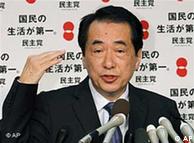时事风云 | 2010.06.04
日本新首相-菅直人
菅直人已经是日本三年来的第五任首相。他是日本民主党的创始人之一,民主党在野时,他已经两度担任过该党主席。观察家预期,菅直人执政后, 日本外交和经济政策不会出现根本性的转变。
以"复兴日本"为目标
菅直人当选首相后立刻表示,复兴日本将是他执政的首要目标。他呼吁民主党成员对自己所能发挥的作用抱有更大的信心。菅直人表示,民主党人应当自信地 站起来,并表示:我们能做到。
迄今为止在左中翼联盟担任财务大臣的菅直人在过去9个月的任期里,坚决推行削减开支政策,提高消费税,以便对这一全球第二大经济体的国家财政进行整 顿。1990年代,菅直人担任厚生大臣(卫生部长)时,就因推动调查一桩血库血液带有艾滋病毒的丑闻而闻名。
短时首相鸠山由纪夫
上周三,鸠山由纪夫宣布辞去首相职务,以此承担政治资金丑闻和破坏竞选承诺的责任。竞选时,鸠山由纪夫曾承诺将美军基地迁出冲绳岛。
但最终,日本政府让步于美国的压力,同意将位于冲绳岛宜野湾居民区中间的普天间美军基地迁往人口稀少的海边地区辺野古。这一立场变化使鸠山由纪夫受 到强烈批评。
去年9月,鸠山由纪夫才刚刚就任首相。在那之前的议会选举中,民主党战胜了几乎连续50余年执政的自民党。
作者:Stephan Stickelmann / Christian Walz/ 苗子
责编:叶宣
Japan Elects a New Premier, Fifth in Four Years

Japanese Prime Minister Naoto Kan on television in Tokyo on Friday.
By MARTIN FACKLER
Published: June 4, 2010
TOKYO — Naoto Kan, a plain-spoken finance minister with activist roots, was elected prime minister on Friday, making him the fifth Japanese leader in four years. Mr. Kan, 63, won a vote in the lower house of Parliament and will now go through the formality of being appointed by Emperor Akihito.
Earlier Friday, hoping for a second chance to fulfill a historic election mandate for change, the governing Democratic Party selected Mr. Kan to succeed Yukio Hatoyama, who resigned on Wednesday over broken campaign pledges.
Mr. Kan faces an uphill task in trying to win back the public support that Mr. Hatoyama had squandered in months of indecision over the fate of an American military base. He must also help the party regain the momentum it had in August after winning a landslide election victory that ended a half-century of virtual one-party rule.
Known for his quick temper, Mr. Kan gained national attention in the mid-1990s when, as health minister, he exposed his own ministry’s use of blood tainted with H.I.V. In the Hatoyama administration, he also served as deputy prime minister and was a point man in the party’s push to rein in the secretive central ministries that have run Japan since World War II.
The cabinet resigned Friday morning to clear the way for the new prime minister to appoint a new cabinet.
Before Friday’s party vote, Mr. Kan vowed to refocus the party on its original goal of ending Japan’s two-decade stagnation. He said he would do this by tackling two of Japan’s most daunting problems, its anemic growth rates and ballooning public debt.
“I will carry on the torch of reviving Japan that the Democratic Party received from the people,” he said.
Touching on his predecessor’s difficulties, he said he would honor an agreement to relocate a United States Marine air base on Okinawa and work to rebuild trust between the allies. But he also said he would place equal emphasis on improving ties with China, with whom Japan now has larger trade relations.
In Friday’s party vote, Mr. Kan defeated Shinji Tarutoko, a relatively unknown legislator backed by the party’s shadowy power broker, Ichiro Ozawa. Mr. Kan won with 291 votes to Mr. Tarutoko’s 129.
Mr. Kan promised to move the party away from the sort of money politics that the scandal-tainted Mr. Ozawa had come to represent.
By choosing Mr. Kan, the party was apparently betting that his background as a former civil rights activist and veteran battler of Japan’s powerful bureaucrats would make him a more forceful leader than the indecisive and professorial Mr. Hatoyama.
Mr. Kan is the latest in what has been nearly a turnstile procession of prime ministers in recent years. Shinzo Abe served exactly one year, resigning under pressure in September 2007. He was succeeded by Yasuo Fukuda and then Taro Aso, each of whom served about one year. Mr. Hatoyama took office on Sept. 16, 2009.

沒有留言:
張貼留言